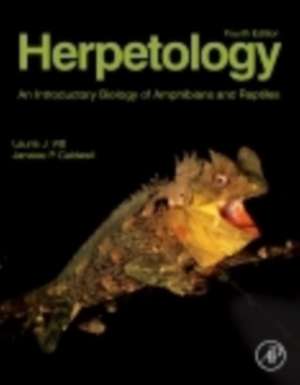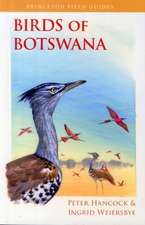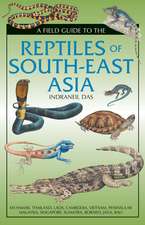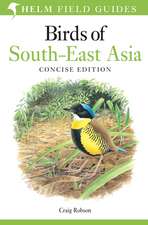Herpetology: An Introductory Biology of Amphibians and Reptiles
Autor Laurie J. Vitt, Janalee P. Caldwellen Limba Engleză Hardback – 9 iun 2013
Examples taken from amphibians and reptiles throughout the world make this book a useful herpetology textbook in several countries. Naturalists, amateur herpetologists, herpetoculturists, zoo professionals, and many others will find this book readable and full of relevant natural history and distributional information.
Amphibians and reptiles have assumed a central role in research because of the diversity of ecological, physiological, morphological, behavioral, and evolutionary patterns they exhibit. This fully revised edition brings the latest research to the reader, ranging over topics in evolution, reproduction, behavior and more, allowing students and professionals to keep current with a quickly moving field.
- Heavily revised and updated with discussion of squamate (lizard and snake) taxonomy and new content reflected in current literature
- Includes increased focus on conservation biology in herpetology while retaining solid content on organismal biology of reptiles and amphibians
- Presents new photos included from authors' extensive library
Preț: 463.47 lei
Preț vechi: 593.82 lei
-22% Nou
Puncte Express: 695
Preț estimativ în valută:
88.68€ • 92.84$ • 73.38£
88.68€ • 92.84$ • 73.38£
Carte tipărită la comandă
Livrare economică 29 martie-12 aprilie
Livrare express 01-07 martie pentru 136.35 lei
Preluare comenzi: 021 569.72.76
Specificații
ISBN-13: 9780123869197
ISBN-10: 0123869196
Pagini: 776
Ilustrații: black & white illustrations, colour illustrations, black & white line drawings, colour line drawings, colour tables, maps, figures
Dimensiuni: 216 x 276 x 42 mm
Greutate: 2.54 kg
Ediția:4. Auflage.
Editura: ELSEVIER SCIENCE
ISBN-10: 0123869196
Pagini: 776
Ilustrații: black & white illustrations, colour illustrations, black & white line drawings, colour line drawings, colour tables, maps, figures
Dimensiuni: 216 x 276 x 42 mm
Greutate: 2.54 kg
Ediția:4. Auflage.
Editura: ELSEVIER SCIENCE
Public țintă
Advanced undergraduate/graduate students studying biology, wildlife and organismal biology and taking courses in herpetology; amphibian and reptile biologists, ecologists and conservation and evolutionary biologists, paleontologistsCuprins
Part I Evolutionary History
1. Tetrapod Relationships and Evolutionary Systematics
2. Anatomy of Amphibians and Reptiles
3. Evolution of Ancient and Modern Amphibians and Reptiles
Part II Reproduction and Reproductive Modes
4. Reproduction and Life Histories
5. Reproductive Modes
Part III Physiological Ecology
6. Water Balance and Gas Exchange
7. Thermoregulation, Performance, and Energetics
Part IV Behavioral Ecology
8. Spacing, Movements, and Orientation
9. Communication and Social Behavior
10. Foraging Ecology and Diets
11. Defense and Escape
Part V Ecology, Biogeography, and Conservation Biology
12. Ecology
13. Biogeography and Phylogeography
14. Conservation Biology
Part VI Classification and Diversity of Amphibians
15. Caecilians
16. Salamanders
17. Frogs
Part VII Classification and Diversity of Reptiles
18. Turtles
19. Crocodylians
20. Sphenodontidans
21. Squamates (Snakes and Lizards)
Part VIII Data Sources
Bibliography
Glossary
Taxonomic Index
Subject Index
1. Tetrapod Relationships and Evolutionary Systematics
2. Anatomy of Amphibians and Reptiles
3. Evolution of Ancient and Modern Amphibians and Reptiles
Part II Reproduction and Reproductive Modes
4. Reproduction and Life Histories
5. Reproductive Modes
Part III Physiological Ecology
6. Water Balance and Gas Exchange
7. Thermoregulation, Performance, and Energetics
Part IV Behavioral Ecology
8. Spacing, Movements, and Orientation
9. Communication and Social Behavior
10. Foraging Ecology and Diets
11. Defense and Escape
Part V Ecology, Biogeography, and Conservation Biology
12. Ecology
13. Biogeography and Phylogeography
14. Conservation Biology
Part VI Classification and Diversity of Amphibians
15. Caecilians
16. Salamanders
17. Frogs
Part VII Classification and Diversity of Reptiles
18. Turtles
19. Crocodylians
20. Sphenodontidans
21. Squamates (Snakes and Lizards)
Part VIII Data Sources
Bibliography
Glossary
Taxonomic Index
Subject Index
Recenzii
"In this fourth edition of their herpetology textbook, Vitt and Caldwell have broken the subject down into six main parts comprised of 22 chapters. The first three parts cover evolutionary history, reproductive schemes, and physiology… Part four covers behavioral topics such as foraging, defense strategies, and communication, while part five is devoted to ecology, conservation and geographical distribution of species. Part six breaks down the classification system used for amphibians and reptiles covering all major subgroups such as frogs, salamanders, snakes, etc…" --Reference & Research Book News, December 2013
"Many of the new insights into the understanding of reptile and amphibian biology have been updated in this edition resulting in its increased size and making it a great value… This book will be an excellent addition to the library of anyone interested in herpetology." --Journal of American Veterinary Medicine Association, December 15, 2013
"Is this the best herpetology textbook available? Yes. Will I use it in my one semester course for upper-level undergraduates? Yes, this book will challenge them and would certainly also be suitable for a graduate course. Is it worth having students buy the new (4th) edition over the 3rd? Yes, updates to the content and to the references cited and enhancement of illustrations are worth it." --Phyllomedusa, December 2013
"Many of the new insights into the understanding of reptile and amphibian biology have been updated in this edition resulting in its increased size and making it a great value… This book will be an excellent addition to the library of anyone interested in herpetology." --Journal of American Veterinary Medicine Association, December 15, 2013
"Is this the best herpetology textbook available? Yes. Will I use it in my one semester course for upper-level undergraduates? Yes, this book will challenge them and would certainly also be suitable for a graduate course. Is it worth having students buy the new (4th) edition over the 3rd? Yes, updates to the content and to the references cited and enhancement of illustrations are worth it." --Phyllomedusa, December 2013







